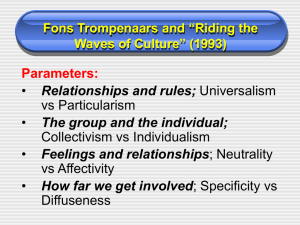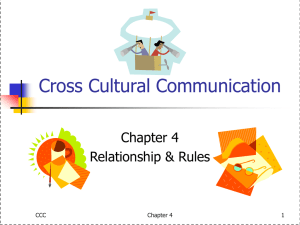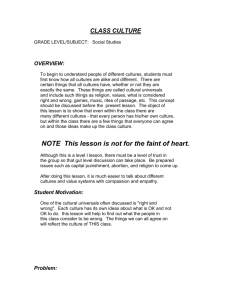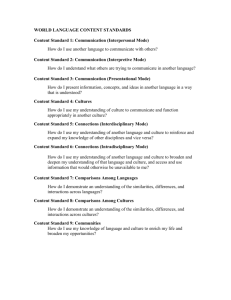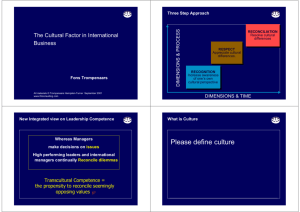Trompenaars - cadeiras.iscte
advertisement
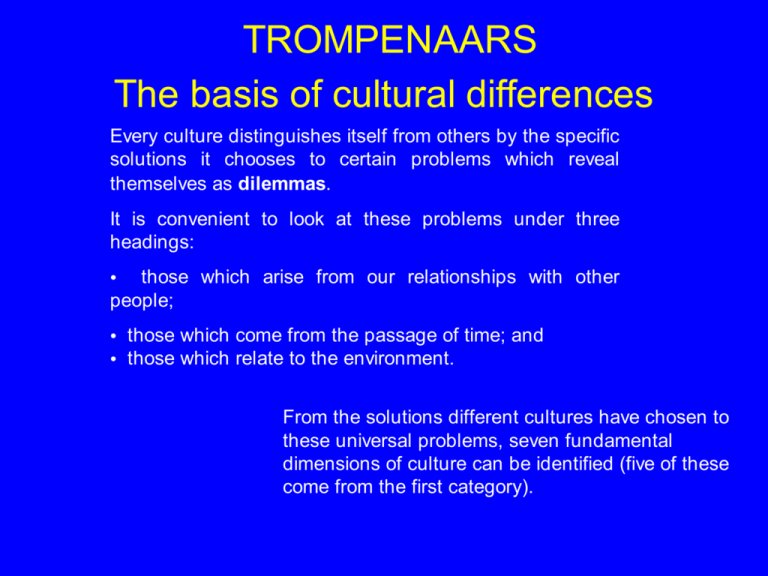
TROMPENAARS The basis of cultural differences Every culture distinguishes itself from others by the specific solutions it chooses to certain problems which reveal themselves as dilemmas. It is convenient to look at these problems under three headings: • those which arise from our relationships with other people; • those which come from the passage of time; and • those which relate to the environment. From the solutions different cultures have chosen to these universal problems, seven fundamental dimensions of culture can be identified (five of these come from the first category). DIMENSIONS OF CULTURE Relationships with people 1. Universalism versus particularism (rules vs relationships). 2. Communitarianism versus individualism (the group vs the individual). 3. Neutral versus emotional (the range of feelings expressed). 4. Diffuse versus specific (the range of involvement). 5. Achievement versus ascription (how status is accorded). Attitudes to time 6. Orientation to past, present and future Attitudes to the environment 7. Internal versus external-oriented cultures Universalism versus particularism The universalist approach is roughly: "What is good and right can be defined and always applies." In particularist cultures far greater attention is given to the obligations of relationships and unique circumstances. For example, instead of assuming that the one good way must always be followed, the particularist reasoning is that friendship has special obligations and hence may come first. Less attention is given to abstract societal codes. Individualism versus communitarianism Do people regard themselves primarily as individuals or primarily as part of a group? Furthermore, is it more important to focus on individuals so that they can contribute to the community as and if they wish, or is it more important to consider the community first since that is shared by many individuals? Neutral versus emotional Should the nature of our interactions be objective and detached, or is expressing emotion acceptable? In North America and northwest Europe business relationships are typically instrumental and all about achieving objectives. The brain checks emotions because these are believed to confuse the issues. The assumption is that we should resemble our machines in order to operate them more efficiently. But further south and in many other cultures, business is a human affair and the whole gamut of emotions are deemed appropriate. Loud laughter, banging your fist on the table or leaving a conference room in anger during a negotiation is all part of business. Specific versus diffuse When the whole person is involved in a business relationship there is a real and personal contact, instead of the specific relationship prescribed by a contract. In many countries a diffuse relationship is not only preferred, but necessary before business can proceed. Achievement versus ascription Achievement means that you are judged on what you have recently accomplished and on your record. Ascription means that status is attributed to you by birth, kinship, gender or age, but also by your connections (who you know) and your educational record (a graduate of Tokyo University or Haute Ecole Polytechnique). In an achievement culture, the first question is likely to be "What did you study?" while in a more ascriptive culture the question will more likely be "Where did you study?" Attitudes to time In some societies what somebody has achieved in the past is not that important. It is more important to know what plan they have developed for the future. In other societies you can make more of an impression with your past accomplishments than those of today. These are cultural differences that greatly influence corporate activities In certain cultures like the American, Swedish and Dutch, time is perceived as passing in a straight line, a sequence of disparate events. Other cultures think of time more as moving in a circle, the past and present together with future possibilities. Attitudes to the environment Some cultures see the major focus affecting their lives and the origins of vice and virtue as residing within the person. Here, motivations and values are derived from within. Other cultures see the world as more powerful than individuals. They see nature as something to be feared or emulated. Dilemma – Riding a car You are riding in a car driven by a close friend. He hits a pedestrian. You know he was going at least 35 miles per hour in an area of the city where the maximum allowed speed is 20 miles per hour. There are no witnesses. His lawyer says that if you testify under oath that he was only driving 20 miles per hour it may consequences. save him from serious Dilemma – Riding a car What right has your friend to expect you to protect him? 1 a My friend has a definite right as a friend to expect me to testify to the lower figure. 1 b He has some right as a friend to expect me to testify to the lower figure. 1 c He has no right as a friend to expect me to testify to the lower figure. What do you think you would do in view of the obligations of a sworn witness and the obligation to your friend? 1 d Testify that he was going 20 miles an hour 1 e Not testify that he was going 20 miles an hour Percentage of respondents opting for a universalist system rather than a particular social group (answers c or b+e) Dilemma: restaurant You are a newspaper journalist who writes a weekly review of new restaurants. A close friend of yours has sunk all her savings in a new restaurant. You have eaten there and you really think the restaurant is no good. What right does your friend have to expect you to go easy on her restaurant in your review? She has a definite right as a friend to expect me to go easy on her restaurant in my review. She has some right as a friend to expect me to do this for her She has no right as a friend to expect me to do this for her Would you go easy on her restaurant in your review given your obligations to your readers and your obligation to your friend? Percentage of respondents who would not write a false review or give no right to the friend to expect to be helped Reconciling universalism and particularism In all the seven cultural dichotomies, of which universalism versus particularism is the first, the two extremes can always in a sense be found in the same person. The two horns of the dilemma are very close to each other, as it is easy to realize if, as a universalist, you substitute your father or daughter for the friend who is driving the car. In fruitful cross-cultural encounters both sides avoid pathological excesses

